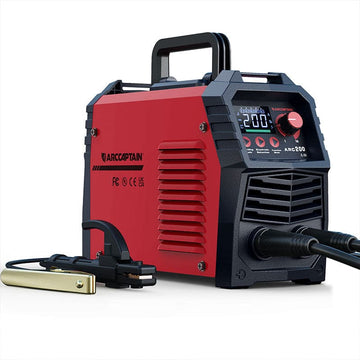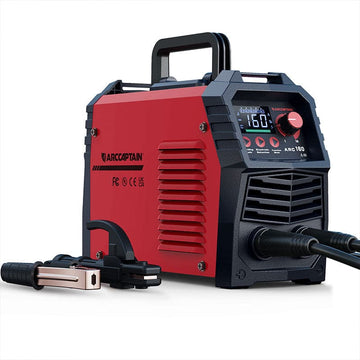Stick Welding Machines
- Featured
- Best selling
- Alphabetically, A-Z
- Alphabetically, Z-A
- Price, low to high
- Price, high to low
- Date, old to new
- Date, new to old
ArcCaptain Stick Welders | Stick Welding Machines
Welcome to ArcCaptain, where our stick welding machines stand ready to power through the toughest jobs. With ArcCaptain stick welders’ innovative designs and unwavering strength, you’re not just tackling projects, you’re crafting legacies.
When precision and reliability are non-negotiable, ArcCaptain welders are the tools professionals reach for.
Explore ArcCaptain’s premium collection of SMAW welding machines, each built to handle a wide range of welding applications, providing durability and performance that our customers have come to rely on. ArcCaptain’s SMAW welding machines can handle both AC and DC power sources, highlighting the flexibility and performance of the machines.
With user-friendly interfaces and robust construction, these machines offer the reliability and efficiency needed for high-quality welds on site or in the workshop.
ArcCaptain stick welding machines are also suitable for repairing cracks in cast iron, providing practical tips for successful repairs. Make your selection today and experience the precision of stick welding with equipment that’s built to last.
Don’t forget to check out our bestselling ArcCaptain collections: arc welders, TIG welders, and welding accessories!
What is Shielded Metal Arc Welding (SMAW)?
Shielded Metal Arc Welding (SMAW), commonly known as stick welding, is a versatile and widely used welding process. It involves the use of a consumable electrode coated in flux to create the weld.
During the welding process, the flux coating disintegrates, producing a shielding gas and a layer of slag that protects the weld area from atmospheric contamination.
This shielding is crucial for preventing defects and ensuring a strong, clean weld. SMAW is adaptable to various metals, including steel, stainless steel, and aluminum, making it a go-to method in construction, fabrication, and repair industries.
Its ability to produce high-quality welds with good penetration and minimal distortion makes it a favorite among professionals.
Benefits of Stick Welding
Stick welding offers numerous advantages that make it a preferred choice for many welding applications:
-
High-Quality Welds: Stick welding is known for producing high-quality welds with excellent penetration and minimal distortion, ensuring strong and durable joints.
-
Versatility: This welding method can be used on a wide range of metals, including steel, stainless steel, and aluminum, making it suitable for various projects.
-
Ease of Use: Stick welding is relatively straightforward, requiring minimal equipment and training, which makes it accessible to both beginners and experienced welders.
-
Cost-Effective: It is a cost-effective solution, especially for welding thick steel and other metals, as it does not require expensive shielding gas or complex equipment.
-
Wide Range of Applications: From construction and manufacturing to repair shops, stick welding is applicable in numerous fields, providing flexibility and reliability.
ArcCaptain Stick Welders: Robust Performance
ArcCaptain’s stick welding machines embody resilience and strength. Offering a wide range of amperage settings and superior arc stability, they are tailored for structural steelwork, pipeline construction, and heavy repair. These stick welders are your steadfast allies, no matter the complexity of the task at hand.
The importance of DC power sources in the performance and flexibility of stick welding cannot be overstated, with options like the Lincoln Electric AC/DC 225/125 Stick Welder and models by Miller and ESAB providing both AC and DC stick welding capabilities suitable for different user needs.
User-Friendly Stick Welding Machines for Every Craftsman
ArcCaptain stick welding machines are designed with the user in mind—intuitive, easy to set up, and even easier to operate. Whether you’re a seasoned professional or a dedicated hobbyist, our machines ensure a smooth welding experience without compromising on quality.
Versatile Stick Welding Equipment For Workshops and Field Jobs
ArcCaptain stick welding machines are built to move. Lightweight yet durable, they offer both AC and DC power options, enhancing their performance and flexibility for various welding tasks. This makes them truly portable welding equipment, ideal for on-the-go welders who need a reliable tool for field jobs and workshops alike.
With the ability to handle multiple electrode types, these machines provide versatility for various welding applications and are a perfect fit for those who value portable solutions.
Stick Welding Techniques and Best Practices
Mastering stick welding involves understanding and applying key techniques and best practices to achieve optimal results:
-
Electrode Selection: Choosing the right electrode is crucial, as it directly impacts the quality of the weld. Different electrodes are suited for different metals and welding conditions.
-
Shielding: Proper shielding is essential to prevent porosity and other defects. The flux coating on the electrode provides the necessary shielding gas during welding.
-
Arc Striking: Consistent arc striking is important to avoid defects. This can be achieved by using the correct technique and electrode for the job.
-
Porosity Prevention: To avoid porosity, ensure adequate shielding and correct electrode selection. Proper technique and clean materials also play a role.
-
Welding Technique: Techniques such as weaving and whipping can be used to control the weld pool and achieve the desired weld profile. Practice and experience help in mastering these techniques.
Safety Precautions for Stick Welding
Safety is paramount in stick welding to prevent injuries and ensure a safe working environment. Key safety precautions include:
-
Personal Protective Equipment (PPE): Always wear appropriate PPE, including a welding helmet, gloves, and safety glasses, to protect against sparks, UV radiation, and hot metal.
-
Ventilation: Ensure good ventilation in the welding area to avoid inhaling harmful fumes and particles. Use exhaust systems or work in well-ventilated spaces.
-
Fire Safety: Take fire safety measures seriously. Use fire-resistant materials, keep a fire extinguisher nearby, and be aware of your surroundings to prevent fire hazards.
-
Electrical Safety: Follow electrical safety protocols, such as using insulated cables and avoiding contact with live electrical parts, to prevent electrical shocks.
-
Access Control: Restrict access to the welding area to authorized personnel only. Ensure that anyone entering the area has the necessary permission and is aware of the safety protocols.
By adhering to these safety precautions, you can create a safer working environment and reduce the risk of accidents and injuries during stick welding operations.
ArcCaptain: Elevating Welding Standards Everywhere
Every ArcCaptain stick welding machine we offer is a result of rigorous innovation and stringent quality control, ensuring that each product is an upgrade to your welding package.
Beyond stick and TIG capabilities, we also provide MIG welders that meet the heavy-duty demands of welding steel with precision. ArcCaptain welding machines are also capable of welding cast iron, providing practical tips for successful repairs.
Our line-up includes dual voltage options for versatile power access and convenience. Plus, we also offer a range of accessories like our top-quality welding helmets, all backed by exceptional customer service. Choose ArcCaptain for an unparalleled commitment to excellence and reliability in the welding industry.
Frequently Asked Questions
What is the best stick welder for beginners?
The ArcCaptain ARC160 is an ideal stick welder for beginners, offering a perfect combination of simplicity, control, and performance. Known for its reliability and ease of use, the ARC160 features straightforward controls and a stable arc that is forgiving for new users. Additionally, the ArcCaptain ARC160 can operate on both AC and DC power sources, providing flexibility for different welding tasks.
Its lightweight and compact design make it a breeze to transport and set up, while its robust build can handle a variety of rod types and metals, making it versatile for many projects. With the ArcCaptain ARC160, beginners will find themselves equipped with a quality machine that supports their development as they build their welding skills.
What thickness can you weld with a stick welder?
A stick welder, also known as a Shielded Metal Arc Welder (SMAW), can weld a wide range of material thicknesses, typically starting from thin gauge metals of around 1/16-inch (1.6mm) to thicker materials well over 1/2-inch (12.7mm), depending on the welder’s power output and the electrode used.
Higher amperage stick welders paired with the correct electrode type and size can tackle substantial thicknesses, whereas lower amperage welders are better suited for thinner materials. It’s important to match the electrode and power settings to the specific welding task for optimal results. Stick welders can also weld cast iron, providing practical tips for successful repairs such as preheating the material and using a high-nickel electrode.
What type of welding should a beginner start with?
A beginner should typically start with Metal Inert Gas (MIG) welding, also known as Gas Metal Arc Welding (GMAW). This type of welding is generally considered the easiest to learn for several reasons. MIG welding machines are user-friendly, with more straightforward setup and operation processes.
The technique is less physically demanding because it uses a continuously fed wire, allowing for longer welds with less interruption. MIG welding also tends to be more forgiving on thinner metals and allows for welding a variety of metal types and thicknesses.
Is stick welding stronger than TIG welding?
The strength of welds from stick welding and TIG welding depends on how they're applied rather than the processes themselves. Stick welding is robust and versatile, suitable for thicker materials and less-than-ideal conditions, making it a go-to for heavy-duty applications.
TIG welding excels in precision and can produce aesthetically superior welds, ideal for thin materials and situations where detail is paramount. Ultimately, both can create welds as strong as the base metals when executed properly, with the weld strength hinging more on the welder's skill and the specifics of the job rather than the welding method itself.
What should I consider when choosing an SMAW welding machine?
When selecting an SMAW welding machine, consider the machine's amperage range, duty cycle, electrode compatibility, and portability, to ensure it meets the demands of your specific welding tasks and provides the flexibility you need for various projects.




